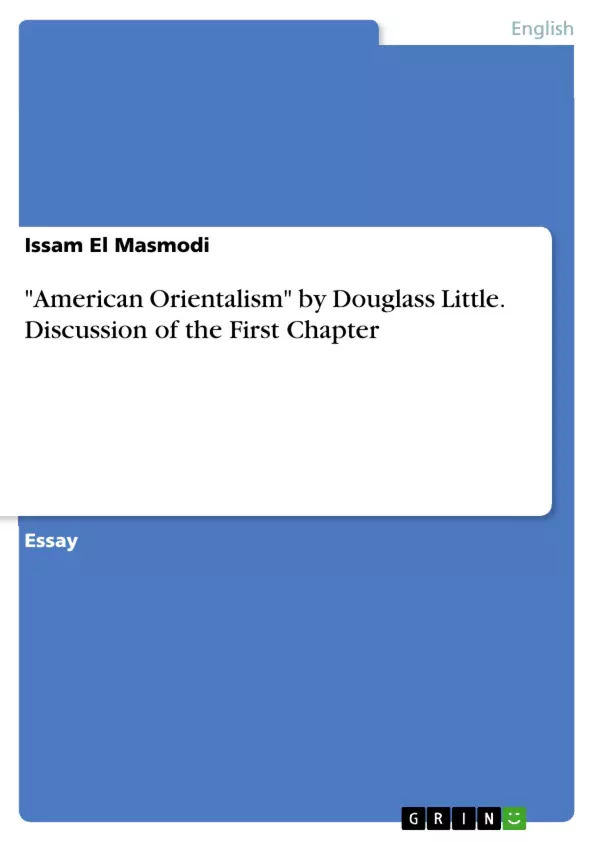It is inescapable to write about American Orientalism without crossing over Orientalism itself for the reason that if there was no Edward Said, the works of Douglass little will not come into being. Said is of great importance as a literary critic as well as a cultural theorist in the sense that what is known now as post-colonialism is highly indebted to Said’s early works including Orientalism. Many critics agree with the fact that post-colonial theorists such as Homi K. Bhabha and Gayatri Spivak could not replace Edward Said.
Above all, he was the first one who set up the foundations of the colonial discourse along with Frantz Fanon. Thus, he has a major influence in the emergence of other post-colonial thinkers. However, this does not mean that Said’s works are holy texts. That is, they have no shortcomings. To name a few, some critics claim that Said’s works are ahistorical meaning that it is impossible that all these orientalists starting from the poet Dante would have the same colonial discursive assumptions. Second, some of the major criticism directed to Orientalism is neglecting the question of agency and resistance by the colonized itself.
Table of Contents
- Orientalism, American style: the Middle East in the minds of American by Douglass Little
- The Puritans, Mark Twain, Arabian Nights and the American Arts
- The philosophy of Us versus Them and Americanizing the Middle East
- Covering Islam and Arabs: the media and the Arab-Israeli conflict
Objectives and Key Themes
This book examines the historical development and ongoing influence of American Orientalism, exploring how Americans have constructed and represented the Middle East in their cultural imagination. The author argues that American Orientalism, much like its European predecessor, has shaped American perceptions of Arabs and Muslims, fostering stereotypes and misconceptions that have fueled political and social tensions.
- The origins and evolution of American Orientalism
- The role of literature, art, and media in shaping American perceptions of the Middle East
- The impact of American Orientalism on American foreign policy and political discourse
- The persistence of stereotypes and misconceptions about Arabs and Muslims in American culture
- The consequences of American Orientalism for the Arab world
Chapter Summaries
- Orientalism, American style: the Middle East in the minds of American by Douglass Little
- This chapter traces the roots of American Orientalism back to the Puritan era, exploring how early American writers and artists developed a romanticized and often stereotypical view of the Middle East. The author examines the works of Mark Twain, Irving Washington, and other influential figures to show how they shaped public perceptions of the region. The chapter also analyzes how the Arabian Nights and other literary works contributed to a romanticized and exoticized representation of the Middle East.
Keywords
American Orientalism, Middle East, stereotypes, misconceptions, literature, art, media, foreign policy, political discourse, Arab world, Islam, Muslims, Arabs, Zionism, cultural representation, cultural imperialism, post-colonialism, the other, binary opposition, Manichean allegory.
Frequently Asked Questions
What is the central theme of Douglass Little's "American Orientalism"?
The book explores how Americans have constructed and represented the Middle East in their cultural imagination, fostering stereotypes that influence foreign policy.
How did Edward Said influence this work?
Douglass Little's work is highly indebted to Edward Said's "Orientalism," which established the foundations of colonial discourse and post-colonial theory.
What are some criticisms directed at Said's "Orientalism"?
Critics claim Said's work can be ahistorical and sometimes neglects the agency and resistance of the colonized people themselves.
How far back do the roots of American Orientalism go?
The roots can be traced back to the Puritan era and were further developed by writers like Mark Twain and Washington Irving.
What role does media play in American Orientalism?
Media representation, especially regarding the Arab-Israeli conflict, often reinforces binary oppositions and stereotypes about Arabs and Muslims.
- Quote paper
- Issam El Masmodi (Author), 2019, "American Orientalism" by Douglass Little. Discussion of the First Chapter, Munich, GRIN Verlag, https://www.grin.com/document/1134994



